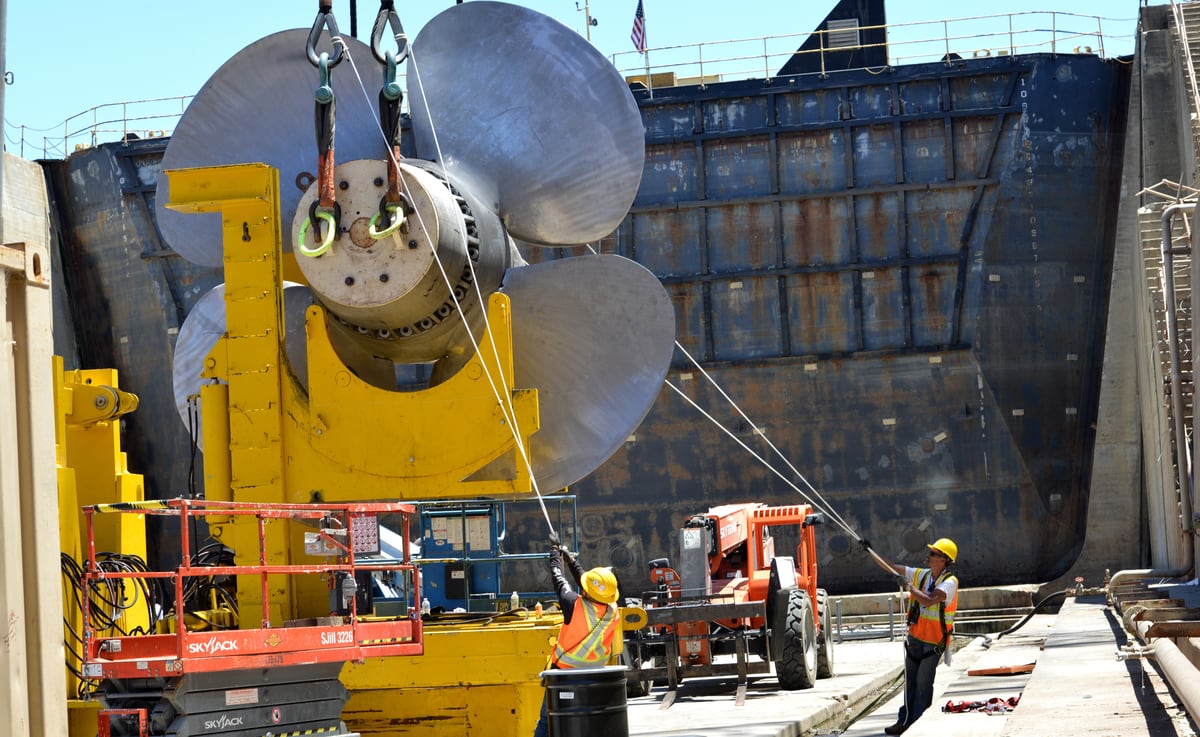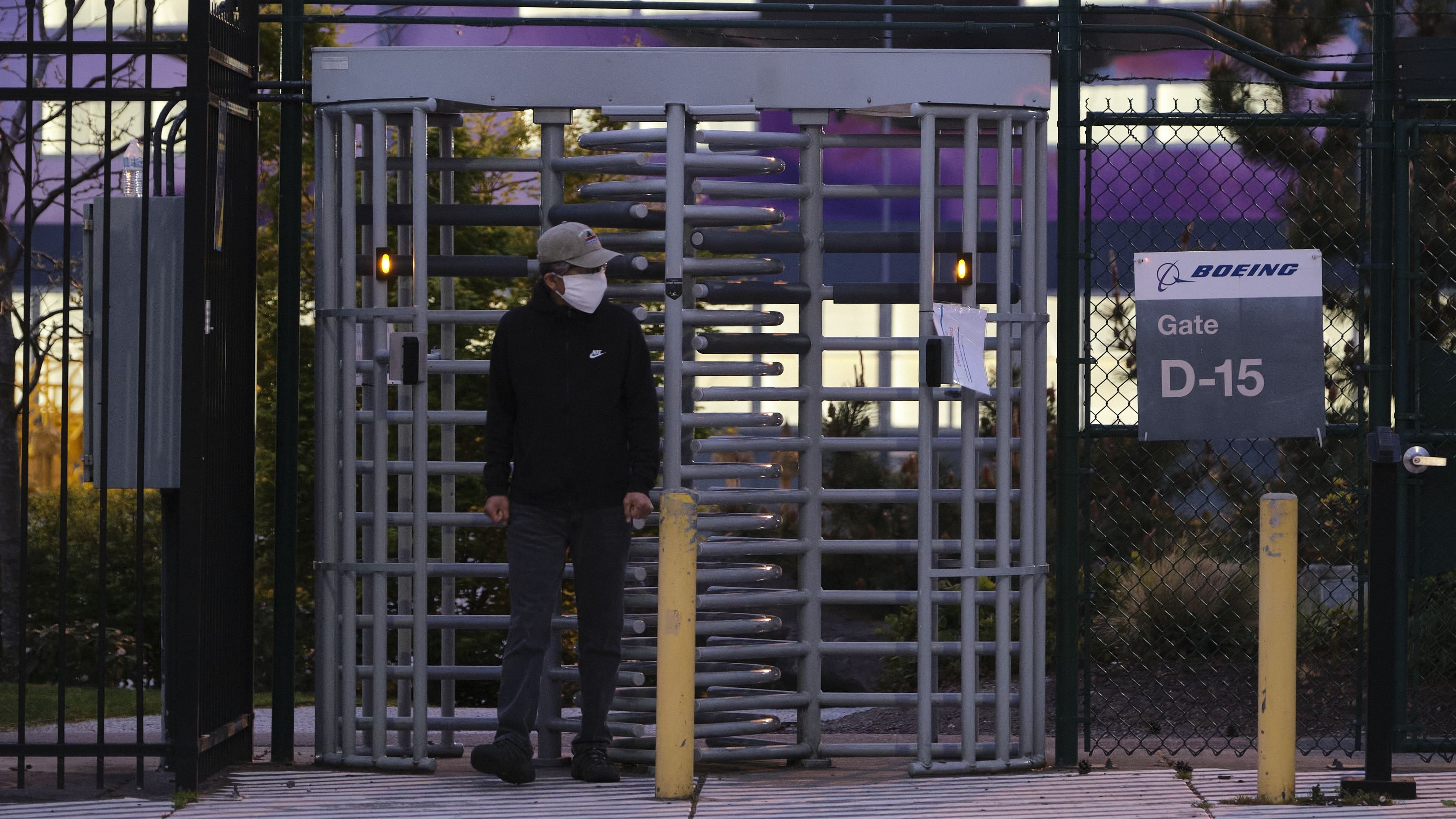WASHINGTON―As the Pentagon works to defray the coronavirus pandemic’s impact on its network of suppliers, it’s worked hand-in-glove with defense and aerospace trade associations to find and address problems in the supply chain. The National Defense Industrial Association, whose members stretch into the lower tiers of the defense industrial base, surveyed more than 700 small businesses to find that cash-flow disruptions remained a problem as the Pentagon and major defense firms increase payments to suppliers.
Retired Air Force Col. Wesley Hallman is NDIA’s senior vice president of policy, charged with monitoring Capitol Hill on matters of concern to defense, including annual budgets, acquisition and procurement reform. This week, he spoke with Defense News about NDIA’s priorities as Congress mulls how to follow its third coronavirus response bill, worth $2.2 trillion and intended to speed relief across the American economy.
With NDIA’s finger on the pulse of the supply chain and recent survey, how do you interpret the Undersecretary of Defense for Acquisition and Sustainment Ellen Lord’s numbers, demonstrating more defense firms that have closed now reopening? What are you seeing among your members?
As you know, A&S has been holding a call on Mondays, Wednesdays and Fridays, and we’ve been participating in all of those. The Defense Contract Management Agency has really been the clearinghouse for all these companies’ challenges, and in fact we’ve been pushing our member companies that are seeing challenges to go to the website and fill in information about what their challenges are what they’re seeing. And DoD has been responsive when something has closed down for whatever reason. Undersecretary Lord herself has picked up the phone to make calls to state governors to explain that we work very hard to ensure that the defense industrial base is considered essential. That was a question when people were starting to call for shelters in place.
The very issues these companies have been seeing are things you’re expecting: the result of closures, and sometimes those closures aren’t state and local but on installations. Many contractors have to go to work on installations, and installation commanders are the mayors of their bases; they’re tasked with the safety and security of their installations, and sometimes they’ve made the call to close facilities that have an effect on those performing contracts.
There’s also a growing concern on liability. There’s uncertainty surrounding contractors’ liability during the crisis for heeding calls to keep everything turned on. They also have to make sure that they’re keeping their workforce safe and secure, and sometimes that’s an issue as you look at reopening everything. Our last NDIA survey was really about what kind of things do you need to reopen to get to a new normal, where we’re producing on contracts. Access to personal protective equipment is a concern, safety is a concern and more.
DCMA has been following up with those companies to see what those issues are and what would allow them to reopen. We all know the supply chain ― and I’m sure you remember our report on the health of the defense industrial base at the beginning of the year ― but one of the things we highlighted is we have a relatively fragile supply chain already. This is a concern of the associations, the Pentagon and particular House Armed Services Committee members.
RELATED

Cash flow was also identified as an issue in NDIA’s survey, and it’s been a feature of DoD’s press conferences. Ellen Lord said she was relying on the trade associations to help DoD understand how its accelerated progress payments are trickling down the supply chain to smaller firms, from the primes. How detailed is the information the associations are providing, and are the primes doing what’s expected of them?
What I have is anecdotal. It’s proprietary data, and our members don’t necessarily share that with us. I did get calls from all of the majors asking about accelerating payments through the supply chain, and one company was very explicit that “we have access to capital to get through this, but our supply chain doesn’t.” Lockheed Martin has been very public with their commitment, and I know they’re worried, and they’re incentivized to keep their supply chain healthy because they’ve got to produce. The companies know their supply chains better than anyone else, so they’re incentivized to push those dollars. It’s not the amount of money but the velocity, and they understand that.
This is me talking, but what the Pentagon wants to show ― and you’ve seen multiple groups saying, “not a dime for defense” ― is that the money that’s being accelerated to these companies is not going to line anybody’s pocket. This is to allow folks to survive. And beyond the national security aspect of this, which we could talk about forever, these are real companies with real people, doing real jobs that are key to our economy. They’re as valid as any of the other small businesses that apply for the Paycheck Protection Program. So, ‘not a dime for defense’ is I think a very shortsighted bumper sticker, because these are real people developing real capabilities for the defense of our nation.
Click here for complete coverage of the COVID-19 outbreak.
There have been some progressive lawmakers, as well as the chairman of the House Armed Services Committee who have already pushed back on the Pentagon’s upcoming request for funding. But more broadly, what would NDIA like to see legislatively in the next stimulus package, including policy―or are your priorities being addressed directly through the Pentagon?
So there’s only so much the Pentagon can do without appropriations. What we’re looking at ― and we are a 501(c)3, non-lobbying organization, though we engage when asked what we think ― is we think, first off, there needs to be a plus-up in appropriations for FY20. We all know that there’s a lot of challenges to performing on contracts right now that are going to extend the length of those contracts. There’s been a slowdown in the ability to perform on contracts because of this, and in some cases it has made made delivery on contracts more expensive.
We believe that should be reflected in appropriations, and that shouldn’t steal from the future. You know, we have a National Defense Strategy, we have a future-years defense program, there's already president's budget in. We don't think that the FY21 should be paying the increased cost for FY20. So it would be a defense supplemental to cover the extra expense to produce on contract because of COVID-19. That's first and foremost.
The other thing is ― and you may know the Defense Logistics Agency and others, they pay out of a working capital fund. Back in November, DLA stopped following the accelerated payment policy passed by Congress because their working capital fund didn’t have the liquidity to make that happen. They backed off to a 30-day instead of a 15-day payout. Well, that was hard enough in November, December, January, February. But you start getting to March with COVID-19, and these folks that have already performed on contract and are waiting to get their money are waiting an extra 15 days because of the lack of liquidity in the working capital funds. That’s not acceptable. So another thing we’d like to see is a bump up in the working capital fund so those accelerated payments can start happening the way that Congress intended.
RELATED

You referenced liability issues. There’s been a movement afoot to shield companies from lawsuits as they seek to reopen that’s been met with partisan pushback. Are liability protections something NDIA favors?
You have to be very careful because you don’t want companies to do something that is not smart or not safe, but you do have to look at it because there’s a potential that this is a ripe avenue for liability suits. We would rather see that stemmed up front so we can focus on producing for the war fighter.
On a positive note, are you seeing companies employing any novel solutions to problems stemming from the pandemic?
The Defense Department has a Joint Acquisition Task Force where companies can go and say what they can produce. We have worked with a lot of companies who can do harnesses for parachutes or where they can shift production to make you masks or other PPE. So it’s been kind of heartening to see. A lot of small businesses are saying, ‘Hey, we can do this.’ And we direct them over to the Joint Acquisition Task Force, which can look at their capabilities and explore those.
Joe Gould was the senior Pentagon reporter for Defense News, covering the intersection of national security policy, politics and the defense industry. He had previously served as Congress reporter.








